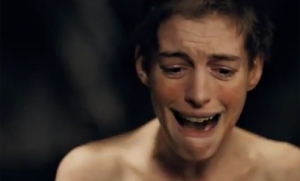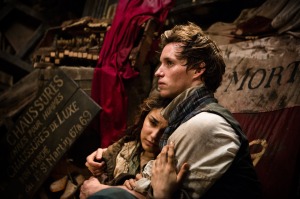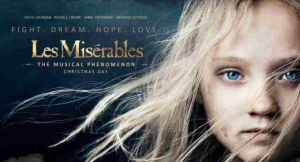Tags
amanda seyfried, anne hathaway, cameron mackintosh, eddie redmayne, hugh jackman, jean valjean, les miserables, musical, russell crowe, samantha barks, the king's speech, tom hooper, victor hugo
“Did You Hear the People Sing?”
Grade: C (SKIP IT)
DIRECTOR TOM HOOPER has said he wanted to take a risk after winning an Oscar in 2010 for “The King’s Speech.” The result, an adaptation of the musical “Les Misérables,” was a nice try but it hits all the wrong notes. Here Hooper has on his hands another historical drama, an abridgement of Victor Hugo’s sweeping, five-volume novel from 1862, and one seemingly perfect for a Christmas day release, rife as it is with Christian themes: mercy, redemption, bread. At one point, we’re told that “to love another person is to see the face of God” and the camera, in the final parish scene, lingers on an ornate golden crucifix perhaps two seconds too long. This comes as a relief since Hooper’s camera otherwise clings to the actors’ faces like a mud-mask and since most, if not all, of the principal players here can’t really sing, it makes their facial over-compensation that much more pained and pronounced. You half wonder whether Hugh Jackson is standing on hot coals during his numbers. Worse, there’s a tone-deaf Russell Crowe (as Javert) and Anne Hathaway, as the maligned Fantine, twisting her face so intensely that you fear for her tear ducts. On stage, “I Dreamed A Dream” is delivered with chest-beating intensity by a woman who has forsaken her dream but not her dignity. Hathaway’s version is more mousy than mighty and it drags the whole movie down to the level of melodrama.
scene, lingers on an ornate golden crucifix perhaps two seconds too long. This comes as a relief since Hooper’s camera otherwise clings to the actors’ faces like a mud-mask and since most, if not all, of the principal players here can’t really sing, it makes their facial over-compensation that much more pained and pronounced. You half wonder whether Hugh Jackson is standing on hot coals during his numbers. Worse, there’s a tone-deaf Russell Crowe (as Javert) and Anne Hathaway, as the maligned Fantine, twisting her face so intensely that you fear for her tear ducts. On stage, “I Dreamed A Dream” is delivered with chest-beating intensity by a woman who has forsaken her dream but not her dignity. Hathaway’s version is more mousy than mighty and it drags the whole movie down to the level of melodrama.
By now, more than 60 million theatre-goers around the globe have seen Cameron Mackintosh’s stage musical and know that “Les Misérables” doesn’t just entertain; it overpowers the audience with an immense cast of flag-waving characters, a barricade made of household furniture, a musical score both hushed (“Bring Him Home”) and hummable (“On My Own”). Five years before it opened in London, to mixed reviews, the musical had a brief trial-run in Paris and at that time, the plot of Hugo’s novel was really only familiar to the French. That was no longer the case by 1985 when “Les Misérables,” powered by Claude-Michel Schönberg’s score and lyrics by Alain Boublil and Jean-Marc Natel, opened at the Barbican Center and from there, took the world by storm. “Les Miz,” as it’s now known, was also big biz: international tours and multiple recordings have made it one of the most successful stage musicals of all time.
Mackintosh’s stage musical and know that “Les Misérables” doesn’t just entertain; it overpowers the audience with an immense cast of flag-waving characters, a barricade made of household furniture, a musical score both hushed (“Bring Him Home”) and hummable (“On My Own”). Five years before it opened in London, to mixed reviews, the musical had a brief trial-run in Paris and at that time, the plot of Hugo’s novel was really only familiar to the French. That was no longer the case by 1985 when “Les Misérables,” powered by Claude-Michel Schönberg’s score and lyrics by Alain Boublil and Jean-Marc Natel, opened at the Barbican Center and from there, took the world by storm. “Les Miz,” as it’s now known, was also big biz: international tours and multiple recordings have made it one of the most successful stage musicals of all time.
 In case you’ve only recently reentered the earth’s atmosphere, “Les Misérables” is about a thief unjustly punished and pursued all his life by an obsessive police inspector. It’s 1815 and jailbird Jean Valjean (Jackman) is being paroled after a nineteen-year sentence for stealing a loaf of bread. He escapes, reforms himself, and reappears as a factory owner and mayor of Montreuil where Crowe’s Javert remains hot on his trail. Around the men swirl the love story of Cosette, the thief’s adopted daughter, and Marius, a political revolutionary swept up in the June Rebellion of 1832. As Cosette, Amanda Seyfried is a surprisingly strong songbird, as is Eddie Redmayne, who lobbied Hooper hard for the part, as Marius. His jaw trembles when he sings and he cries his way, profusely so, through the closing dirge “Empty Chairs at Empty Tables.” Still, they’re actors, not singers, and it’s puzzling why Hooper failed to cast a stronger vocalist than Samantha Barks as Éponine. Each one of her costars is a one-dimensional vocalist at best and that’s a serious problem in a sung-through musical more than two and half hours long. Consider this costumed karaoke.
In case you’ve only recently reentered the earth’s atmosphere, “Les Misérables” is about a thief unjustly punished and pursued all his life by an obsessive police inspector. It’s 1815 and jailbird Jean Valjean (Jackman) is being paroled after a nineteen-year sentence for stealing a loaf of bread. He escapes, reforms himself, and reappears as a factory owner and mayor of Montreuil where Crowe’s Javert remains hot on his trail. Around the men swirl the love story of Cosette, the thief’s adopted daughter, and Marius, a political revolutionary swept up in the June Rebellion of 1832. As Cosette, Amanda Seyfried is a surprisingly strong songbird, as is Eddie Redmayne, who lobbied Hooper hard for the part, as Marius. His jaw trembles when he sings and he cries his way, profusely so, through the closing dirge “Empty Chairs at Empty Tables.” Still, they’re actors, not singers, and it’s puzzling why Hooper failed to cast a stronger vocalist than Samantha Barks as Éponine. Each one of her costars is a one-dimensional vocalist at best and that’s a serious problem in a sung-through musical more than two and half hours long. Consider this costumed karaoke.
Never has “Empty Chairs at Empty Tables,” which arrives toward the story’s conclusion, been more welcomed and more apropos since Tom Hooper’s “Les Misérables” knows how to clear a room.


I thought it was okay, but not as great as most people say. I especially agree that Tom Hooper’s direction was pretty distracting. Nice review.
Thanks; who is praising this? I liked Anthony Lane in the New Yorker: “I screamed a scream of time gone by.” Atrocious singing
I guess I too am out on my own as I felt those close-ups which you disliked brought at intimacy to it. Agreed though that Crowe was the weakest singer and seemed not commanding enough in stature as Javert. Perhaps a taller slimmer actor more similar to the stage character. I caught your cheekie word plays 🙂
You always do! Oh boy, Crowe made me very unhappy every time he appeared on screen and I was only too grateful for his suicide. It wasn’t so much his stature but his complete incompetence as a singer
Good review Colin. Definitely had an emotional impact on me, so much to the point that I actually have the soundtrack on my Ipod. That never happens.
“Christian themes: mercy, redemption, bread.” LOL! 😀
I disagree about Hathaway though. She was incredible. She’s probably going to win an Academy Award, Colin, just to forewarn you 😉
Aside from that though, I agree with you on the film. For me it was just too long, the singing slayed me, and it was too sprawling a story to really hold my attention properly. 😦
Thanks for reading; isn’t it crazy that in the age of diminishing attention spans, movies seem to be getting longer? Lots could have been cut here. I read the movie houses lose money with the studios making films 2 hours plus. Wanna get them in and out! I’m afraid there will be no Oscar for Hathaway this year and that’s a bet!:-)
YES! There was no balance. It overwhelms and overdoes it to the point of irritation. Finally a reviewer who understands!
Geez, thanks; yeah, totally annoyed and laughing frankly by the last 30 minutes, which couldn’t have come soon enough. Hated, hated, hated this movie. What are you reviewing?
i was going to review les mis, but i didn’t have the energy 😛 I have a review on Before Midnight (ethan hawke, julie deply) in the works coming out this year.
BEFORE SUNRISE is one of my favs; can’t wait to read